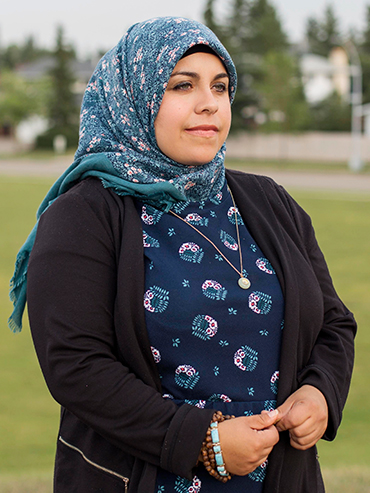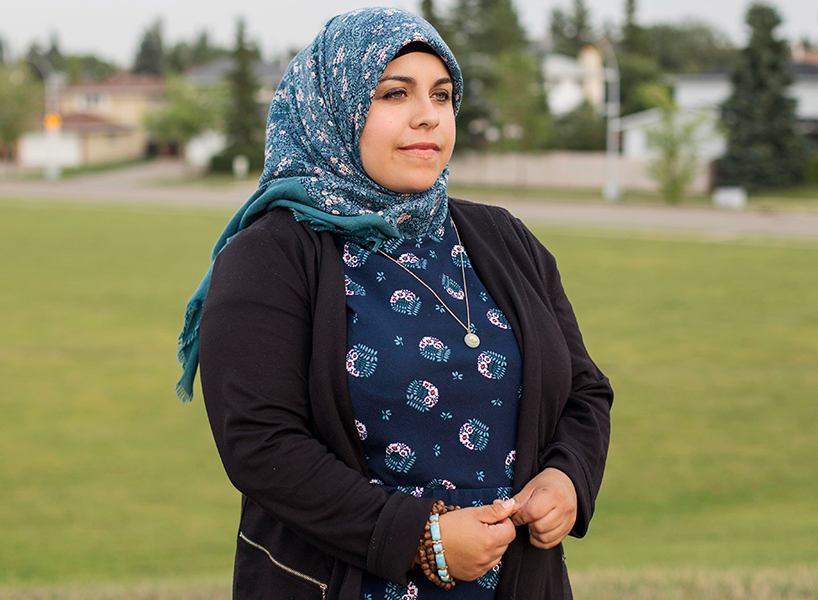This Viral Facebook Post Urges People to Rethink Self-Care
After the New Zealand attack, Nakita Valerio wrote, "Shouting 'self-care' at people who actually need community care is how we fail people."


I was exhausted—sitting on my bed, frustrated by the number of responsibilities on my plate as a mother, business owner and community organizer. I knew I was in a bad state and the solution I kept seeing from articles being shared in my personal online network was to practice “self-care,” meaning that I should relax, take a bubble bath, eat some chocolate or even do some laundry to take my mind off things. But none of that felt like it was enough.
It had only been nine days since the terrorist massacre of 50 Muslim worshippers in Christchurch, New Zealand. As I went about my daily life in a state of grief, fielding messages from media needing interview contacts, allies needing action ideas or other Muslims needing support, my weariness got the better of me. I felt unable to move or do anything to help myself knowing that one step would invariably be followed by a thousand more: a bottle to be washed, a shower to be had, an article to write, a piece of justice to push for—with no end in sight.
I’m a millennial—from a generation that is burnt out, living in a culture that says you have to be able to have it all, despite a system that often feels like it’s built against our generation. And, on top of all that, mainstream media tells us to figure out how to heal ourselves from the psychological toll of grief and oppression as well. What I needed wasn’t a bubble bath, but for someone to come over, help with the dishes, order some food while they watched my kids and to leave me alone to process and grieve.
At that moment, a fellow Muslim named Saint wrote me on Instagram to “check in”—a regular practice in my community that has become essential for our survival. I told Saint that, at times like this, I felt like other people, especially non-Muslims, needed to step up to share the challenges that come with just existing as a Muslim woman. I went on Facebook and typed out a single-sentence status: “Shouting ‘self-care’ at people who actually need ‘community care’ is how we fail people.”
A few hours later, I opened my phone and the status had not only been liked by hundreds of people, it was shared thousands of times. Over the next 48 hours, it received almost 10,000 shares, was screenshotted and shared across Instagram and was quoted on Twitter. No matter the platform, the sentiment seemed to resonate with people.
Shouting "self-care" at people who actually need "community care" is how we fail people. – Nakita Valerio
— Stephanie Tait ♿️ (@StephTaitWrites) March 31, 2019
It’s not as if this feeling was new, nor was the concept itself. Women of colour in particular have been calling for a shift to community care for years, and yet the onslaught of the self-care industry continues. In the anger of the moment, this was the first time I had put the words together in exactly that way—and perhaps more important to me than the post’s reach were the comments and messages that rolled in along with it. Person after person from all across the world and all social positions validated and affirmed what I too was feeling: None of our problems can be solved by a pedicure.
Self-care is about the individual caring for their own basic physical needs, whereas community care is focused on the collective: taking care of people together, for everything from basic physical needs to psychological and even spiritual ones. Community care is a recognition of the undeniable cooperative and social nature of human beings and involves a commitment to reduce harm simply through being together.
In the dozens of messages that came from the post, I heard from people belonging to a variety of racial and religious minorities, disability advocates, as well as queer and trans folks talking about what constantly shouldering the burden of oppression was doing to their mental health—negative effects which have been validated through research.
Logann Grace, an non-binary Jewish friend living in New York, shared how the post had spread to their trans eating disorder group, sharing that it resonated because “society and the media have stigmatized [mental illness] so many suffer in silence, myself included.” Similarly, Alex Bland, a religious studies scholar and disability activist from California, reached out to talk about how community care is the new model in disability community work, rather than “independence being an ultimate goal” or marker of success. For him, the Facebook status validated his experience. An artist in Ontario, Kenzie Schweyer similarly agreed on the importance of the post’s sentiment, to the point that she opted to print photos of the status to hang up around her school. Nina Laderoute, a Cree Metis woman, simply reached out to emphasize that the post gave her “warmth and hope.”
Rethinking how we heal
The link between oppression and negative effects on mental health have been well-established. “We now have decades of research showing that when people are chronically treated differently, unfairly or badly, it can have effects ranging from low self-esteem to a higher risk for developing stress-related disorders such as anxiety and depression,” UCLA professor Vickie Mays said in an article that explored discrimination as a public health concern. Here at home, the Canadian Public Health Association shared a similar sentiment in December, calling for racism to be considered a public health issue.
Self-care only offers temporary relief to the deep-rooted structural challenges many of us face, and often it can be its own form of commodified labour that becomes an additional stressor for the person expected to perform it. So what does the alternative look like? What is community care?
Community care means showing up; it means that when you find yourself in the position of being able to give more than you need to receive, you do so. Depending on who you are and your strengths, this might mean receiving messages from someone who needs to be comforted and heard, bringing dinner to a sick friend or packing up an abused friend’s belongings as part of their exit plan from domestic violence. It could be attending a performance in support of an artist, or advocating for communities you have consulted at the level of government. At different times and for different communities, people who are intentionally invested in caring for the communities they belong to might find themselves doing all of these things, or something else entirely.
Ultimately, community care is a commitment to contributing in a way that leverages one’s relative privilege while balancing one’s needs. It’s trusting that your community will have you when you need support, and knowing you can be trusted to provide the same.
After posting that sentiment on Facebook in the days after the New Zealand attack, I not only received an outpouring of online support and validation, but it made me realize more than anything that I’m not alone in needing it. As a community organizer, especially as a Muslim woman, I can sometimes forget just how important the community spaces we build are, but this has only emboldened me to persist in building them.
Especially now, in a world full of increasingly violent rhetoric and acts, where politicians grab at cheap votes and electoral success by dividing us, community care becomes essential. Unlike self-care, this response isn’t about a bandage solution: It’s about healing wounds together and eliminating the hazards that caused them together, too.
Related:
Here’s The Deal With Quebec’s New Secularism Bill
Stacy Lee Kong: “If It Feels Like Racism In Canada Is Getting Worse, That’s Because It Is”
“As a Muslim Woman, the Edmonton Attack Left Me Sad and Scared for My Safety”








